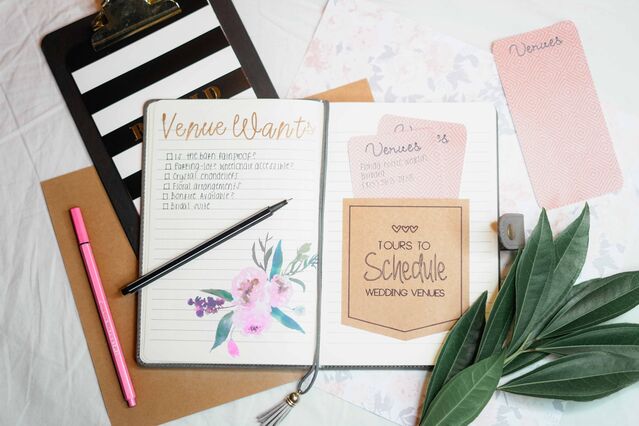Depression
Avoiding Post-Wedding Depression
Embracing a “we” versus “me” wedding planning mentality.
Posted July 26, 2022 Reviewed by Ekua Hagan
Key points
- Including one's partner in wedding planning can reduce post-wedding depression.
- Happy brides focus on “we” vs. “me” when planning their weddings.
- When planning a wedding with one's partner, it's best to engage in curious and gentle inquiry when resolving differing opinions.

In my last post, I outlined strategies for managing uncertainty as a way to help prevent post-nuptial depression. In this post, we’re going to take a look at another strategy—embracing a “we” versus “me” mentality—in hopes of helping you live your happily ever after.
Research on post-nuptial depression found that “blue brides” and “happy brides” differed on how much they centered themselves in the wedding planning process1—in other words, how bridezilla-y they were. Blue brides, for instance, reported focusing on their own desires for their wedding and making the day entirely about themselves. In fact, brides in Stafford and Scott’s study noted that it was “their” day and it had to be perfect. Happy brides, however, viewed their wedding as a joint experience with their groom, their friends, and their family1.
A "we" versus "me" mentality
Adopting a “we” versus “me” mentality, as I call it, is another step you can take to protect yourself (and your marriage) from the post-wedding blues. Yes, you are getting married, but there is another person involved too, so ditch the “It’s my day” mindset and embrace the “It’s our day” mantra.
First, include your partner. This may seem obvious, but as soon as the proposal celebrations are finished, many brides begin planning their wedding and often forget to bring their partner along for the journey. Socialization is partially to blame for this brain lapse as we often receive messages from pop culture that weddings are all about the bride and that grooms don’t (or shouldn’t) care about wedding planning2.
It’s important to push aside antiquated gender norms and include your partner. Although it will be nice for your partner to have their vision represented at your wedding, the very act of inclusion and collaboration is what is really important. Working with your partner on the planning process signals that you care about their input and opinions. Including your sweetie pie shows that you want this to be a representation of your relationship, not just your own individual personality. Finally, working together on wedding planning provides good practice for joint decision-making, collaboration, and compromise that you will be doing a lot of during your marriage.
Second, discuss wedding wishes. Now that you’ve included your partner, you’ll want to determine what is or isn’t important to the two of you. Perhaps you and your partner couldn’t care less about décor details like menus or place cards. Great, neither of you has to make those decisions and can maybe delegate that to someone in your social network, which I’ll discuss in my next post.
But perhaps your partner has strong opinions about flowers and wants to incorporate his deceased grandmother’s favorite blooms into your special day. Awesome, let your partner take the lead on floral selection. Or perhaps flowers are important to both of you. Cool, now you get to work together to create a flower-scape that encapsulates both of your wishes.
Despite how much we try, wedding planning will not always go this smoothly. You and your honeybun are bound to have divergent opinions on something. Instead of shutting down or ignoring your partner’s suggestions or requests, especially if they clash with your vibe, be curious to learn the “why behind the request.” To do this, it’s essential to engage in gentle and curious inquiry. That is, ask an open-ended question in a gentle way.
For instance, if your partner is fighting for the Macarena on the playlist, despite knowing how much you despise it, don’t say, “Why do you even care about that dumb song? Are you trying to tick me off?” Instead, try, “This sounds really important to you. Can you share with me the story behind it?” Maybe you’ll find out that it brings back happy memories from weddings your sweetie attended in childhood or that it’s his Dad’s favorite song. Knowing the story behind the request will make it much easier to say “a-okay!” and will bring your and your partner closer.
Third, agree to joint decision-making. Even if one partner gets to take the lead on a certain aspect of planning, like flowers or music, both partners have to give the green light on the final decisions. This means no “I’m sorry, the florist needed an answer, so I just went with tulips” or “My mom and I had talked about this weeks ago and we just went with the buffet versus plated dinner.” Nope. All decisions are signed off on, together. Even if one partner isn’t fully enthusiastic about the choice, they should never be left out of the process.
Finally, to ensure that you and your sweetie are planning as a “we” and not a “me,” it’s important to designate wedding planning time/discussions. Don’t spring a flower choice or song selection decision on them the moment they walk in the door; instead, carve out time that works for both of your schedules to talk through choices and work on tasks together. Scheduling time allows you to focus on the task at hand and each other, distraction-free. Frustration is bound to happen if you or your partner want to talk wedding planning but the other isn’t in the right headspace.
Together, these tips will help you and your honey plan as a “we” versus a “me.” Further, practicing collaboration, joint decision-making, and curious and gentle inquiry are skills that will help you on your way to happily ever after.
References
Stafford, L., & Scott, A. M. (2016). Blue Brides: Exploring Postnuptial Depressive Symptoms. Journal of Family Issues, 37 (15), 2213–2231. https://doi.org/10.1177/0192513X15576199
ADDIN ZOTERO_BIBL {"uncited":[],"omitted":[],"custom":[]} CSL_BIBLIOGRAPHY Stafford, L., Faulkner, S. L., & Scott, A. M. (2020). It’s the Best Day of Your Life: Dominant Discourses in Brides’ Wedding Planning. Communication Studies, 71 (2), 226–243. https://doi.org/10.1080/10510974.2020.1713186




